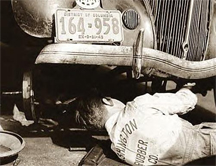A ‘niche’ occupation
Let’s face it: copywriting is a fairly ‘niche’ occupation. Not many people outside the marketing field know much about it. OK, they may know that copywriters write scripts for well-known TV commercials or press ads. Pressure them to take it any further, however, and there’s usually a resounding silence!
It’s safe to say that copywriting is a ‘specialist’ line of work. So why would the argument arise about the merits or otherwise of a specialist or non-specialist copywriter? After all, the general perception is that copywriting is already specialised enough thank you very much. Maybe it’s human nature – or the nature of our over-developed Capitalist economies – to want to create new sub-sets of esoteric skill-sets.
Nevertheless, divisions and differentiation do exist. And that is in a field without the apparent range of the law or accountancy which cover almost every level of our society to include specialists such as divorce or commercial lawyers, forensic or tax accountants – to name just a few.
What copywriters do
To anyone outside the marketing world, a copywriter writes words that help organisations publicise themselves, their products and/or services. So far, so good. As a copywriter, you’re expected to be able to write anything that’s ‘commercial’. In other words, the specialism is established – and copywriting is a non-specialist or ‘generalist’ skill with multiple applications.
Scratch the surface, however, and it soon becomes clear that the world of advertising and marketing is a complex mosaic of techniques and skills that operate differently in different market sectors and with different target audiences. It is this diversity with which copywriting and copywriters are challenged.
It’s probably more illuminating to look at this from the wholly differing perspectives of organisations who want to maximise their investment in copywriting skills, and copywriters who may be considering whether further specialisation is desirable or viable as a ‘career move’.
Specialist or generalist?
As with most other professions, it’s a reasonable assumption that most copywriters start off as ‘generalists’. In this way, they will learn the ropes and find out which aspects of the craft are most appealing to them personally – and in which aspects they excel. This includes skills such as sales letter writing, website copywriting, advertising concepts, media relations and a hundred other things.
Another consideration arises before taking the specialisation route. This relates to specific market sectors, many of which have their own unique demands. Property sector copywriting, for instance, is hugely different from writing for the IT or telecomms sectors, whilst financial copywriting requires a totally different grounding from, say, travel copywriting.
Some copywriters choose to specialise because they have a long-term interest in cars, travel or some other hobby. They may have been employed previously in an industry that provided the perfect background to become a specialist copywriter in that field.
Accidental specialist
Yet another route to arriving as a specialist copywriter can only be described as ‘accidental’. Many copywriters opt for copywriting as a career because they have a natural fluency with words, or they know someone in the industry who gave them a job.
The ‘accidental’ road to becoming a specialist copywriter could easily arise from a series of commissions from an agency (or other client) which inadvertently builds a respectable portfolio in a particular sector or type of copywriting (such as direct mail).
Organisations that use copywriting services often have to decide whether to use a specialist or non-specialist, although this depends on their line of business (among other things). There’s a broad division between business-to-business and consumer/fmcg copywriters. The approach that’s required is very different, although some would say that the ultimate ends are the same, namely, to persuade individuals to take specific courses of action.
Relevant experience
Companies in the technology and other specialist sectors will rightly seek out writers with relevant experience. As with so many industries, having insider knowledge of the market, the jargon and what motivates people to engage with you – all this shows in the copy. Talking the same language as your target audience is an essential pre-requisite of marketing success.
For companies of almost every type, the Internet provides a huge choice of copywriters, each with their own skills, experience and fee-levels. For copywriters themselves, the opportunities have never been greater – nor has the level of competition.
Supply and demand is changing the structure of the copywriting market. The demand for online content is huge and this has created an army of ‘opportunist’ copywriters with limited experience or talent. Fortunately, highly skilled copywriting will always be required across all business sectors. As ever, the future will evolve with market forces.


